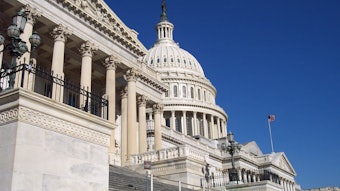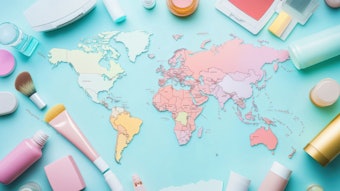
Global industries are wound up over the unknown impact of U.S. President Donald Trump's trade tariffs, which are scheduled to take effect on April 5, 2025. Most recently, a 10% baseline tariff on all imports was announced, which per the BBC will impact the following regions.
- United Kingdom
- Singapore
- Brazil
- Australia
- New Zealand
- Turkey
- Colombia
- Argentina
- El Salvador
- United Arab Emirates
- Saudia Arabia
And these regions are getting off easy compared to others. The BBC reports tariffs as high as 54% on China, including earlier tariffs; 49% in Cambodia; and 46% in Vietnam.
Impacts in the Beauty Industry
As the world prepares for uncertain impact, one can only conjecture how these changes could affect our own industry. Vogue reported, "The implications for supply chains and manufacturing processes are raising critical questions..."
For example, could higher tariffs increase costs for globally sourced ingredients, packaging and finished goods? This impact on supply chains may reduce profitability, stifle innovation and delay product launches.
In addition, independent beauty brands, with less financial flexibility, are particularly at risk, potentially limiting competition and diversity in the market. Rising prices could also shift consumer behavior toward private-label goods, domestic brands or simpler routines.
Vogue also underscored that for an industry dependent on international suppliers and intricate production networks, swift adaptation is essential to maintain growth and relevance.
CTPA Statement on Trump Tariffs
Responding to the new tariffs, Nico Shaw Núñez, director of regulation for the Cosmetic, Toiletry and Perfumery Association (CTPA), released the following statement.
"The UK and the US maintain a strong trading relationship in relation to cosmetics and personal care products. In 2024, the UK exported approximately £360M worth of products to the U.S., with imports from the U.S. accounting for almost double at £680M. This made the U.S. our biggest trading partner outside of the European Union last year, a position that has been relatively stable over time.1
"The imposition of tariffs, where previously there had been none, will certainly affect this trading relationship. We cannot predict to what extent, but these tariffs will result in added cost to make UK products available to U.S. consumers, a cost which will have to be absorbed by companies or passed onto the consumer directly.
"While the UK will be subject to additional 10% tariff rates, the supply chains that enable cosmetic and personal care products to reach consumers have become increasingly global. Products originating from the EU will be subject to higher rates at 20%, and products from China at 34%, for example.
"With supply chain ties to both regions, as well as other countries, it is unclear yet how this will affect UK companies. CTPA will be working with members to clarify matters such as these and continue to raise our industry’s challenges brought by these measures.
"The UK Government has established a strategic position with regards to the UK-U.S. relationship, and CTPA supports any approach that looks to secure our long-term goal of supporting free trade for cosmetics and personal care products."
PCPC Statement on Trump Tariffs
Francine Lamoriello, executive vice president for global strategies at the U.S.-based Personal Care Products Council, additionally released a statement responding to the tariffs.
"Access to global markets is critical to our industry’s success and our ability to invest in U.S. manufacturing and highly skilled jobs. We believe this can be best achieved by a combination of approaches that address the underlying factors leading to trade distortions and expanding export and investment opportunities that strengthen the ability of our members to compete around the world.
"We are concerned about trade policies that could result in higher prices for personal care products and impact our industry’s growth and global competitiveness. The cosmetics and personal care products industry is a key driver of the U.S. economy, with more than $68 billion in U.S. manufacturing and 4.6 million U.S. jobs. Our industry directly contributes over $300 billion to our nation’s GDP, and our products are essential to the daily lives of all U.S. residents, with millions of consumers using about six to 12 products each day, including sunscreen, toothpaste, shampoo, moisturizer and fragrance.
"We maintain our support for balanced trade policy approaches that would create U.S. jobs and strengthen critical global market opportunities for our member companies and continue to work diligently to inform the Administration and Congress of the impact of U.S. trade policies on our industry, U.S. investments and consumers."
Strategic Adaptation is Key
The ripple effects of these tariffs could redefine beauty industry dynamics, prompting the need for strategic adaptation to maintain growth and relevance.
Reference
1. uktradeinfo. Consulted March 2024 for relevant HS codes relating to cosmetic products










